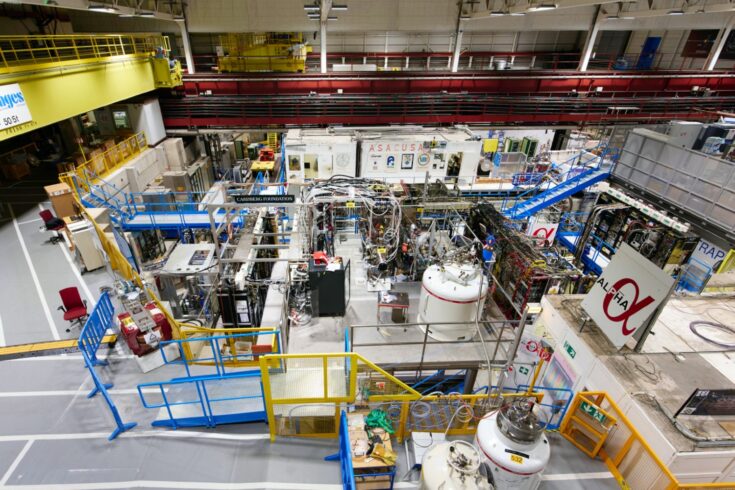Science and Technology Facilities Council
|
|
UK-supported experiment at CERN announces antimatter discovery
New research from the ALPHA collaboration at the CERN Antimatter Factory has shown for the first time that antimatter responds to gravity in the same way as matter.

Aerial view of the ALPHA experimental area. Credit: CERN, Julien Marius Ordan
Antimatter particles are identical to the matter particles which make up the physical world, but with the opposite electrical charge.
The paper, published in the journal Nature, shows that, within the precision of the experiment, atoms of antihydrogen fall to Earth in the same way as their matter equivalents.
Testing crucial theories
Our understanding of the effects of gravity are largely based on Albert Einstein’s general theory of relativity which was coined in 1915 and has passed many experimental tests since.
A component of the theory called ‘the weak equivalence principle’ states that all matter, regardless of its mass or composition, should free-fall the same way in response to gravity.
Although the prevailing view is that antimatter should behave in the same way as matter in response to Earth’s gravitational pull, direct observations have been lacking until now, owing to challenges in creating carefully controlled experimental conditions.
Exciting new territory
ALPHA spokesperson, Professor Jeffrey Hangst, said:
In physics, you don’t really know something until you observe it.
This is the first direct experiment to actually observe a gravitational effect on the motion of antimatter. It’s a milestone in the study of antimatter, which still mystifies us due to its apparent absence in the Universe.
Professor Niels Madsen at Swansea University deputy spokesperson of ALPHA said:
As the first direct observation of the effect of gravity on antimatter, this sets the stage for future, much more detailed measurements sought by multiple collaborations.
A collaborative achievement
Since it was established in 2005, the ALPHA collaboration has been working to discover the nature of antimatter.
The collaboration has received long-term investment from the Engineering and Physical Sciences Research Council, which has enabled the team to deliver key knowledge and enhance capabilities.
UK membership of CERN is managed by the Science and Technology Facilities Council (STFC) on behalf of the UK government. Engineers at STFC Rutherford Appleton Laboratory developed the cryostat and part of the ALPHA-g beamline that were critical components for doing this experiment.
A collaborative achievement
Executive Chair of STFC, and UK Research and Innovation (UKRI) Champion for Infrastructure, Professor Mark Thomson, recently said:
It’s a rare moment that we are able to confirm our understanding of the laws of physics with this level of certainty.
This is a remarkable technical achievement and a testament to the hard work and ingenuity of the ALPHA-g collaboration as well as international partners such as engineers at STFC’s Rutherford Appleton Laboratory without whose technical expertise, this experiment would not have been possible.
Looking to the future
The findings are the culmination of decades of work designing and perfecting the experimental method used.
The team hopes to build on their success by measuring the acceleration of antihydrogen as it falls to earth as precisely as possible.
You can find out more about the results and how they were achieved on the CERN website.
Original article link: https://www.ukri.org/news/uk-supported-experiment-at-cern-announces-antimatter-discovery/


